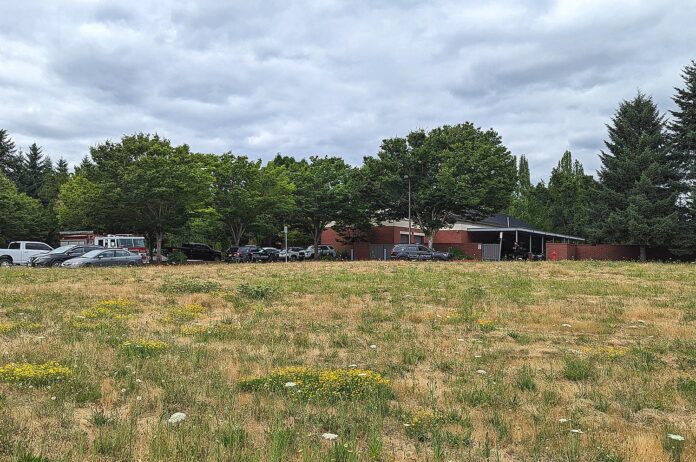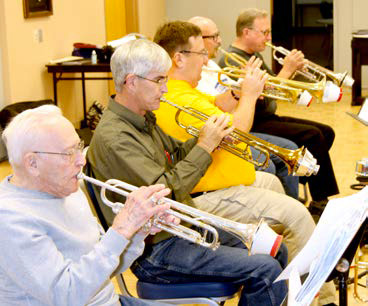
New rules restricting homeless camping in Tualatin took effect this month, outlining where, when, and how the city’s houseless population can sleep for the night and what time they must vacate every morning.
Under the so-called “time, place, and manner” ordinance, homeless camping is limited to one grassy parcel along Southwest Tualatin Road adjacent to the police station and permitted only between 7 p.m. and 7 a.m.
“The ultimate goal is to transition people experiencing unsheltered homelessness into shelter and permanent housing,” deputy city manager Megan George said, calling it a complicated issue that affects many communities.
The ordinance, approved unanimously by City Council on June 26, prohibits camping in city-owned parks, parking lots, within 20 feet of buildings, and 500 feet of freeways and schools. Camping is also illegal on publicly owned land, greenways, landscaped areas, protected wetlands, natural areas, and in the library plaza – essentially leaving just the police station site.
Still, it puts Tualatin in compliance with a state law requiring all cities and counties to create “reasonably objective” space and hours for overnight sleeping.
Under Oregon House Bill 2115, passed in 2021, Oregon cities and counties cannot enact outright camping bans. The law followed the 2018 9th Circuit Court of Appeals ruling Martin v. Boise, in which the court found cities couldn’t punish homeless people for lying or sleeping on public property if they had no other place to rest.
Two sites were initially considered as potential camping areas, the lot beside the police station and a smaller gravel lot near Tualatin Commons at Nyberg Street and Boones Ferry Road.
Multiple community members at the meeting asked City Council to approve only the larger space off Southwest Tualatin Road, which has room to house about 50 tents.
Police estimate there are about 15 homeless camps in the city, largely tucked out of sight.
“Why start with two camps? Why not just one? And preferably the one by the police station,” one woman said.
Her sentiments were echoed by others, who say the city should first learn how to manage issues like garbage, providing bathrooms and water, and ensuring camps do not become overcrowded in one location.
Another resident asked, “What’s the minimum number of sites we need to comply?”
Rick Smith, who said he’s lived in Tualatin for more than three decades, spoke out against allowing a camp near Tualatin Commons, calling it the identity and “crown jewel of our city” and suggesting the larger grassy site near the police station would be a good place to learn.
The city’s goals are four-fold, George told council members: Legal compliance with the July 1 deadline, providing city staff with clarity on implementing and enforcing the ordinance, consistency when possible, with regulations rolling out in neighboring jurisdictions, and balancing “the intended use of properties with compassion for people experiencing homelessness.”
Tualatin’s regulations are tighter than similar new rules approved recently in Tigard, which left multiple spaces legal for overnight camping and will allow camps to remain standing later into the morning.
Tigard’s broader rules allow camping from 7 p.m. to 9 a.m. on city property and most sidewalks, and greenspaces around Tigard City Hall, Tigard Public Library, and Public Works facilities, but not parks or parking lots, but prohibit fires and gas heaters.
Camps in the designated area must be 10 feet from other campsites and no larger than 12 x 12. Trash must be removed. Fires, digging, and connecting to unauthorized electric sources are prohibited. Campers can use gas heaters to keep warm.
Council members spoke unanimously in support of launching with a single site.
“I’m in favor of starting slowly, then moving and progressing,” Councilor Marie Reyes said. “I’m in favor of the police station lot.”
The ordinance doesn’t regulate sleeping in cars, which falls under parking laws.
“Vehicular camping is one of the more fuzzy areas that came through in the ordinance,” George said. “Some cities have tackled it, and some cities have chosen not to. We decided not to include it in our ordinance at this point because it wasn’t clear how we can and cannot regulate vehicular camping.”
Camping in vehicles is allowed for up to 72 hours in residential areas. It’s illegal to park overnight in parks, parking lots, and on public land, and the designated camping zone is only for tents.
“A person would not be able to drive their car onto the grassy lot (beside the police station),” George said.
According to George, Washington County is working on developing a system in conjunction with local law enforcement to determine if a shelter bed is available and whether it meets the needs of the individual experiencing homelessness.
Then theoretically, they could say, “There is a bed available for you; you cannot sleep outdoors,” she said.
City Council plans to revisit the topic in January 2024.


















